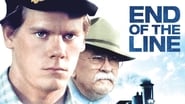Ameriatch
One of the best films i have seen
ReaderKenka
Let's be realistic.
Protraph
Lack of good storyline.
ChanFamous
I wanted to like it more than I actually did... But much of the humor totally escaped me and I walked out only mildly impressed.
saint-738-168861
This movie does not go anywere.
It is not a realistic drama portraiting the poorest side of America, it is not a tale for children.
DigitalRevenantX7
Haney & Leo have been working at their town's local rail freight depot for decades. But when the company that owns the depot shuts it down in order to switch to air freight, the pair decide to steal a locomotive & drive it all the way to Chicago in order to make a case about saving their jobs, in the process turning them into folk heroes.End of the Line was a drama made in 1987, starring Wilford Brimley & Levon Helm as a pair of railroad workers suddenly made redundant by corporate restructuring. The story is an interesting one (something that would be more relevant here in Australia since the Australian Labor government of 2007-2013 introduced their carbon tax – a tax that was designed to shut down the country's automotive industry which it ultimately did, thanks to the tax's designers, the Australian Greens & their nutty desire to turn Australian drivers into a nation of pushbike riders) & the acting is excellent from all corners. Kevin Bacon makes another of his appearances as Brimley's son-in-law, who has a bad case of gambling addiction & runs a small-time betting ring. But the film is hamstrung by a lack of purpose that hurts the film's chances of becoming a minor classic.
editguy
As much as I love trains, I couldn't stomach this movie. The premise that one could steal a locomotive and "drive" from Arkansas to Chicago without hitting another train along the way has to be right up there on the Impossible Plot lines hit board. Imagine two disgruntled NASA employees stealing the "crawler" that totes the shuttles to and fro and driving it to New York and you get the idea.Having said all that, it's a nice try. Wilford Brimely is at his Quaker Oats best, and Levon Helm turns a good performance as his dimwitted but well-meaning sidekick. Bob Balaban is suitably wormy as the Corporate Guy, and the "little guy takes on Goliath" story gets another airing.
rsoonsa
This delightful piece relates of an unscheduled jaunt aboard a locomotive "borrowed" by veteran trainmen Will Henry (Wilford Brimley) and Leo Pickett (Levon Helm) after their employer, Southland Railroad, shifts its manner of freight transport to the airlanes, resulting in the closure of a railyard in Clifford, Arkansas, with a subsequent loss to many in the small town of their livelihood. Freshman director Jay Russell, invited while attending a similarly fledgling Sundance Institute's workshop to develop his script, does so very effectively, with most of the filming taking place near his hometown of Little Rock, enabling Russell's strongly regional feeling for the South to aid him in composing a very personal, well-executed work. The locomotive is being taken by Will and Leo to Chicago, wherein the pair hope to present their grievances to the parent corporation's board chairman, and Russell formulates a recipe for some delicious humour, some satirical, during the adventure, with blessedly minimal slapstick, focussing not only upon the two railroaders but their waiting families, as well. A well-selected cast is aptly directed, with particularly strong performances from Kevin Bacon, Mary Steenburgen and Holly Hunter, the last two of whom gift the scenario with delicious comedic timing. With talented supporting players helping to make possible a successful blend of whimsy and the didactic, END OF THE LINE belies its rather low budget, assisted to a large extent by cinematographer George Tirl, who here intensifies the standard colour scale while utilizing a wide range of facial lighting to help in representing performers' thoughts.



